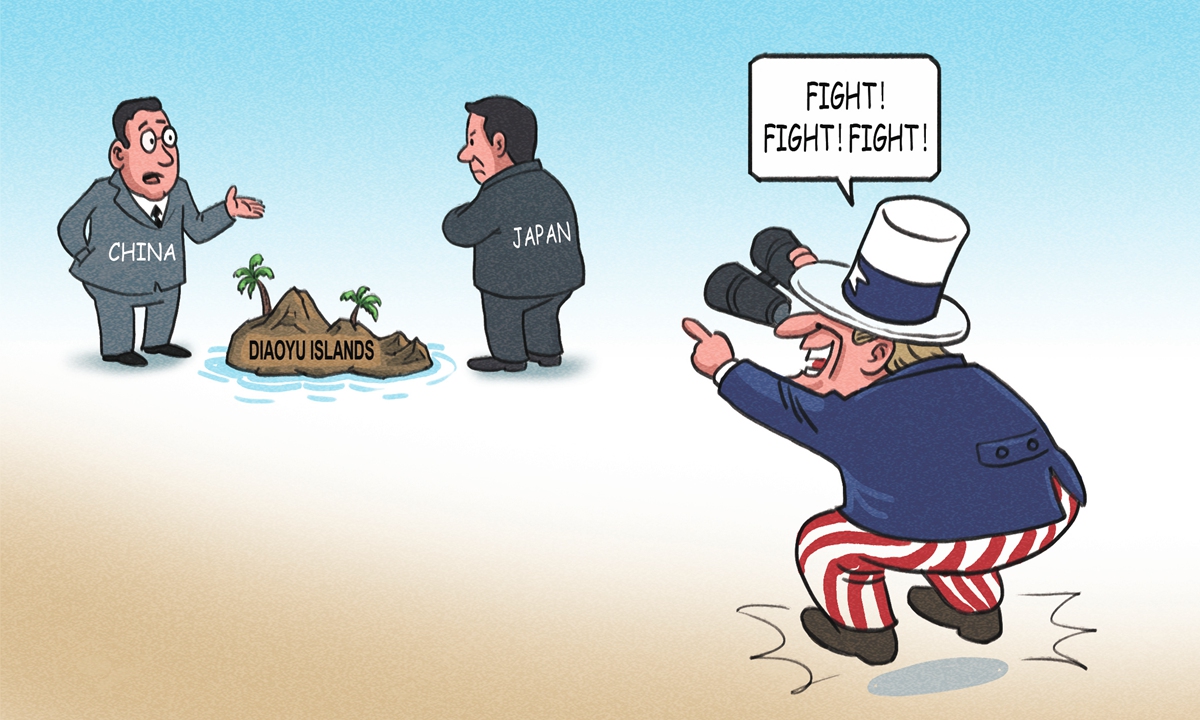Washington desperately wants to start trouble overseas for selfish interests
By Ai Jun Source:Global Times Published: 2020/6/22 21:48:40

Illustration: Liu Rui/GT
As tensions between China and India over border disputes remain, mainstream US media has revealed US eagerness to seize the opportunity to sow more discords between China and its neighboring countries. Brad Lendon, CNN.com International homepage editor, published on Saturday an article entitled "Why this Japan-China island dispute could be Asia's next military flashpoint," portraying the Beijing-Tokyo divergence over the Diaoyu Islands as a "military tinderbox waiting to explode."
A similar tone has been hyped often enough by the US media. Take NBC News. It quoted US officials and experts as suggesting "from Hong Kong to the South China Sea to the India-China border, Beijing is flexing its muscle and trying to extend its reach at a time when the world is preoccupied with the deadly COVID-19 pandemic."
Did those US media and elites forget it is Washington that deployed three aircraft carriers to the Western Pacific lately, displaying US military might and hegemony?
Nevertheless, Lendon is still immersed in his paranoia, saying "if Japanese territory is attacked by a foreign power, the United States is obligated to defend it." He quoted inflammatory comments from an observer as saying "the question is not whether China… would want to challenge Japan over the islands. The question is when, and how?"
The controversy over the Diaoyu Islands has been largely brought under control over the past few years. It did not turn into a major obstacle in ties between Beijing and Tokyo, and is far from being a tinderbox. But US elites have been hoping to see a confrontation, even an outbreak of war, between China and its neighbors.
The US has been stirring up trouble in the Asia-Pacific region, coordinating with its previous pivot to Asia-Pacific strategy and current Indo-Pacific Strategy. The South China Sea issue was proof. Yet, in the end, relevant countries had not been fooled. China-Philippine relations have improved since Philippine President Rodrigo Duterte took office in 2016 and decided to set aside the maritime dispute and develop pragmatic cooperation with China.
The purpose of some Americans is obvious - they want to see Asian countries exhaust each other, so the US can benefit from the outcome.
Washington has been interfering in the Diaoyu Islands disputes for a long time. As tensions between Beijing and Tokyo were running high in 2010 over the issue, then US secretary of state Hillary Clinton proposed a three-way meeting with China and Japan, and reassured Japan by claiming the Diaoyu Islands "fall within the scope of Article 5 of the 1960 US-Japan Treaty of Mutual Cooperation and Security."
In fact, the US' bossy manner in its interference in Asia has made its regional allies suffer. Take Japan. It decided in 2017 to introduce Aegis Ashore, the land-based US missile defense system, under pressure from the US, yet soon met anger and opposition from local residents of candidate locations to host the system due to the possibility that interceptors would fall within nearby residential neighborhoods, and the overly high cost. As a result, Tokyo had to halt the deployment process.
Behind the curtain of disputes between China and its peripheral countries, be it divergences with Japan, South Korea and the Philippines, traces of US intervention can often be found. Yet over the past few years, most of the controversies have been managed well, thanks to efforts from each relevant party. Regional countries have also realized that the US has been tying them to Washington's wagon in pursuit of US interests.
In the latest clash on the China-India border, Uncle Sam also played a role. As Arif Rafiq, president of Vizier Consulting LLC, a Morocco-based political risk advisory company, argued, India's Hindu nationalist government is emboldened by the US, yet "it would be a mistake for New Delhi to count on Washington's support."
The US, which is reeling from the novel coronavirus epidemic, desperately wants to see trouble in other parts of the world, and is thus inciting a fight with China in it. At this point, Asian countries need more wisdom and stronger capability to avoid falling into the US-designed trap. After all, no Asian country is willing to be Washington's cannon fodder.
Posted in: OBSERVER